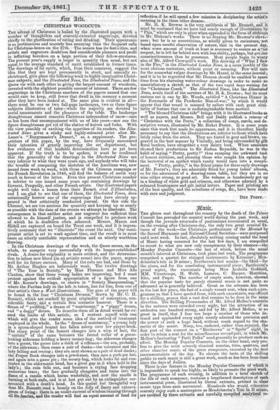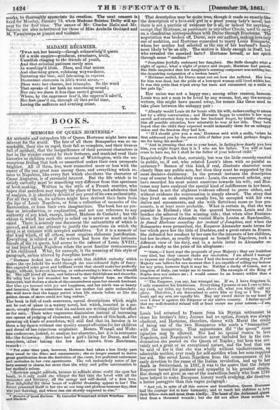Tan gloom cast throughout the country by the death of
the Prince Consort has pervaded the musical world during the past week, and though the juvenile saturnalia of pantomimes commenced as usual, on the evening after Christmas-day, the only two great musical fix- tures of the week—the Christmas performance of the Messiah by the Sacred Harmonic and National Choral Societies—were postponed until next week. In fact, absolutely nothing coming under the head of Music having occurred for the last few days, I am compelled to revert to what are now only conspicuous by their absence—the Monday Popular Concerts—the hist of which, before the usual month's interval at Christmas, took place last week. The programme comprised a quartet for stringed instruments by Krommer • Men- delssohn's trio in D minor; Beethoven's last sonata—the 32nd—for the piano, and for the concluding instrumental piece; Beethoven's grand. septet, the executants being Miss Arabella Goddard, MM. Vietutemps, H. Webb, Lazarus, C. Harper, Hutchins, Ries, and Paque. The number of empty seats, however, showed that the popular taste for purely classical music is not quite so advanced as is generally believed. Great as the advance has been iii the last few years, the fact of a single vacant seat, when such a pro- gramme as that I have quoted from, with such executants, was offered for a shilling, proves that a vast deal remains to be done in the same direction. The Shilling Promenades of Mr. Alfred Mellon's concerts in the autumn were crowded every night, but the attraction of an Orchestra one hundred strong, and led by Mr. Alfred Mellon, is so great in itself, that I fear too large a: number of those who lis- tened and applauded every night merely admired the precision and the power of such a huge band, without much regard to the cha- racter of the music. Many, too, endured, rather than enjoyed, the first part of the concert on a "Beethoven" or "Spar" night, in order to retain a seat for the miscellaneous second part, in which Mr. Mellon's fascinating "Patti Polka" used generally to produce such an effect. The Monday Popular Concerts, on the other hand, only pro- fess to give the most severely classical sonatas, trios, quartets, and other chamber music of the great composers, executed by the first instrumentalists of the day. To elevate the taste of the shilling public to such music is still a great work, much as has been been done since the days of Jullien.
There is one feature in the Monday Popular Concerts of which it is impossible to speak too highly, as likely to promote the good work. The programme of each evening, in addition to a brief' sketch of the life of each composer, contains a lengthened description of each instrumental piece, illustrated by liberal extracts, printed in clear music type from each movement. Hundreds who would otherwise scarcely enjoy such a masterpiece as Mendelssolues Trio in D minor, are enabled by these extracts and carefully compiled analytical re-
marks, to thoroughly appreciate its creation. The next concert is fixed for Monday, January 13, when Madame Sainton Dolby will ap- pear for the first time. The names of Mr. Charles Halle and Mr. Sainton are also substittited for those of Miss Arabella Goddard and Vieuxtemps.as pianist and violinist.





























 Previous page
Previous page